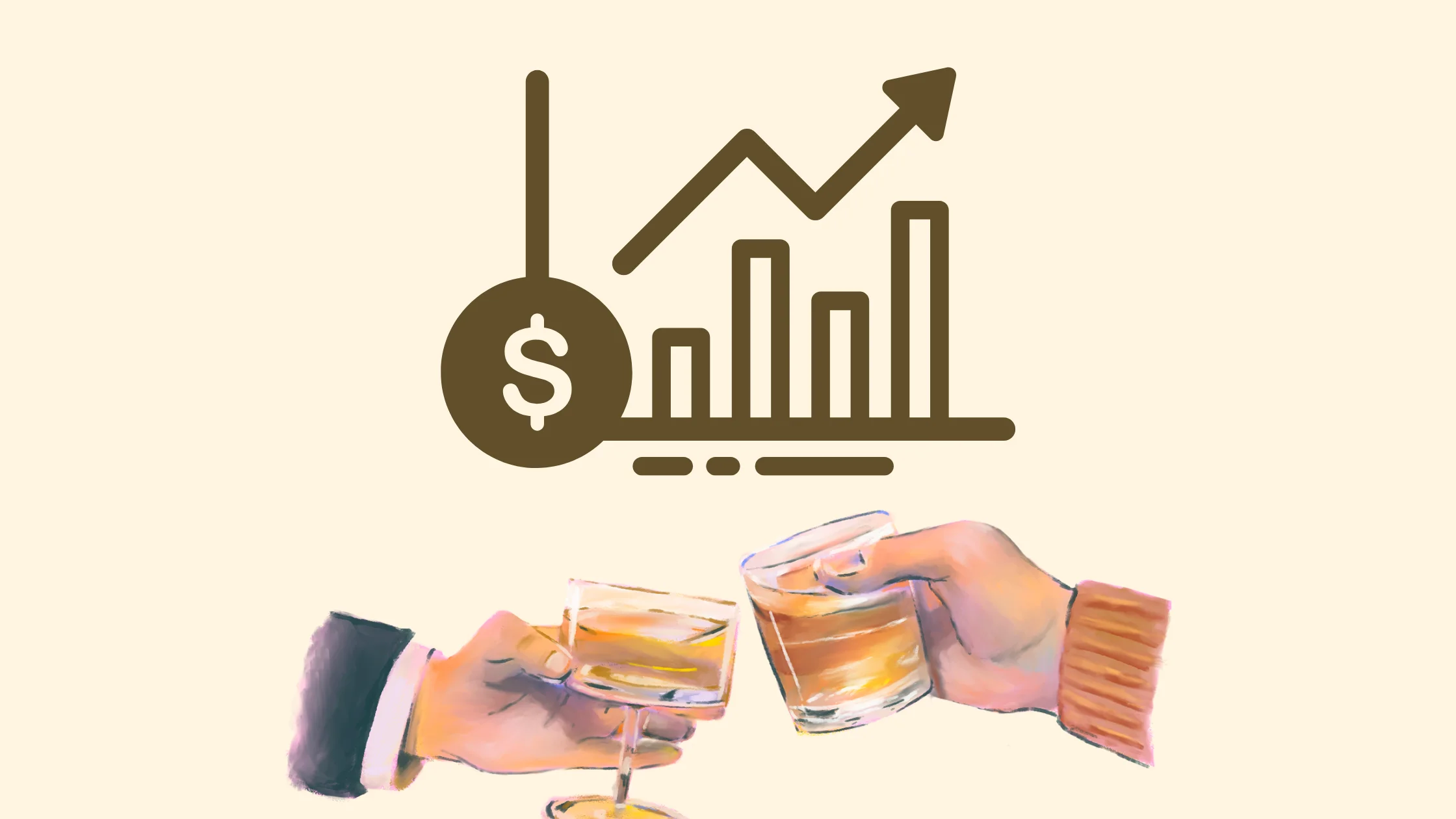Are you intrigued by the idea of merging your passion for whiskey with the potential for financial gain? Welcome to the fascinating world of whiskey investing, a niche yet booming market that’s capturing the attention of enthusiasts and investors alike. This guide is your comprehensive introduction to everything you need to know about investing in whiskey, from understanding the basics of why and how to invest, to navigating the complexities of the market, and even managing the risks involved.
Whether you’re drawn to the allure of rare bottles, the unique investment opportunity presented by whiskey casks, or the diversified approach of whiskey investment funds, there’s a wealth of information here to help you make informed decisions. So, pour yourself a dram, and let’s dive into the rich, rewarding journey of whiskey investing.
What is whiskey investing?
Whiskey investing is an alternative investment strategy that revolves around the purchase of bottles or casks of whiskey, with the goal of selling them for a profit at a later date. This strategy leverages the aging process of whiskey, which can significantly enhance its value over time. As whiskey matures, its scarcity and quality can increase, potentially leading to lucrative returns for investors.
Investing in whiskey requires a comprehensive understanding of the whiskey market, including an awareness of which brands and types are most likely to appreciate in value. Investors must also navigate considerations such as storage conditions and insurance to safeguard their investment. The appeal of whiskey investing lies in its dual nature, combining a passion for whiskey with the opportunity to achieve financial gains.
The global demand for rare and aged whiskey has fueled the popularity of whiskey investing. However, it’s important to acknowledge the risks involved, including market volatility and the threat of counterfeit products. Successful whiskey investing necessitates meticulous research, patience, and occasionally, a bit of serendipity.
Why invest in whiskey?
Investing in whiskey presents an opportunity for high return potential, especially when focusing on rare and aged bottles whose value tends to increase substantially over time. The growing global demand for premium whiskey, fueled by a burgeoning appreciation among connoisseurs and collectors worldwide, further bolsters its investment appeal. This escalating interest is not confined to established markets but is also spreading to emerging economies, thereby expanding the scope for investment.
The allure of whiskey investment lies in its unique combination of passion and profit. For enthusiasts with a deep affection for whiskey, this form of investment offers a way to merge their interest with the possibility of financial gain, making the endeavor not just lucrative but also deeply satisfying. Unlike intangible financial assets, whiskey provides a tangible sense of ownership and enjoyment, adding a layer of personal satisfaction to the investment.
Nonetheless, it is critical to approach whiskey investing with caution, mindful of the inherent risks such as market volatility and the risk of encountering counterfeit products. Despite these potential pitfalls, with diligent research and patience, whiskey investing can emerge as a rewarding and engaging venture for those who are passionate about this distinctive spirit.
High return potential
The allure of whiskey investing primarily lies in its high return potential. Distinctively, as whiskey matures, its market value can soar, particularly for selections from notable distilleries or those that are part of a limited edition. This increase is attributed to the whiskey’s enhanced quality and scarcity over time, rendering it a prized possession among collectors and aficionados.
Investors who strategically choose their whiskey investments can achieve significant gains upon selling, especially if they have stakes in bottles that ascend to a coveted status in the marketplace.
Growing global demand
Global demand for whiskey is experiencing a robust expansion, fueled by an escalating appreciation for premium spirits worldwide. This surge is significantly bolstered by emerging markets, where a new demographic of consumers is keen to delve into the world of high-quality whiskey. This burgeoning consumer interest is generating more avenues for investors, as the clamor for rare and aged whiskey increasingly surpasses the available supply.
With whiskey gaining traction not only as a collectible but also as a luxury consumable, the market’s vitality is poised to sustain, offering a promising landscape for investments to prosper.
How does whiskey investing work?
Whiskey investing offers several avenues, each with unique opportunities and challenges. Here’s a closer look at the primary strategies:
Buying whiskey bottles
Investing in whiskey bottles is a popular entry point for many investors. This strategy focuses on acquiring collectible single malts or limited edition releases that are likely to appreciate in value over time. For example, bottles from the Macallan distillery have been known to significantly increase in value, such as the Macallan 1926, which sold for over $1 million at auction.
Investing in whiskey casks
Cask investment involves purchasing whole casks of whiskey, allowing the investor to own the spirit as it ages and potentially increases in value. A notable case is the sale of a 30-year-old cask of Macallan 1989, which sold for over £242,000 in 2019, showcasing the lucrative potential of cask investments.
Whiskey investment funds
Whiskey investment funds pool resources from multiple investors to buy a diversified portfolio of whiskey and whiskey-related assets. These funds are managed by experts who aim to maximize returns through strategic buying, storing, and selling of whiskey. For instance, the Whiskey and Wealth Club has reported substantial returns for its investors, highlighting the potential of this investment strategy.
To provide a clearer overview, here’s a detailed table showcasing examples of successful whiskey investments:
| Investment Type | Example | Details | Return on Investment |
|---|---|---|---|
| Bottle | Macallan 1926 Fine and Rare | Sold for over $1 million at auction | Significant appreciation from original retail price |
| Cask | 30-year-old cask of Macallan 1989 | Sold for over £242,000 in 2019 | Substantial return considering initial cask purchase price |
| Fund | Whiskey and Wealth Club | Offers diversified whiskey investment portfolios | Varies, with reports of strong annual returns |
What are the risks of whiskey investing?
Investing in whiskey, while offering the allure of substantial returns, is not without its inherent risks. Understanding these risks is crucial for any investor considering entering the whiskey market.
Authenticity and condition
The authenticity and condition of whiskey are paramount to preserving its value. Investors have faced challenges with forgeries and condition issues that significantly impacted their investments. For instance, in 2018, a laboratory test revealed that a bottle of 1878 Macallan, bought for a record price at a Swiss hotel, was a fake, dating back to no earlier than 1970.
This incident underscores the importance of thorough verification and proper care.
Risk of forgeries
The risk of forgeries in the whiskey market is a significant concern. High-profile cases, such as the aforementioned 1878 Macallan forgery, highlight the potential financial losses investors can face when counterfeit bottles enter the market. Ensuring authenticity through reputable sources and expert verification is essential.
Storage conditions
Proper storage conditions are essential for maintaining whiskey’s quality and, by extension, its investment value. Factors such as temperature, light, and humidity must be carefully controlled to prevent degradation. Improper storage can lead to deterioration in quality and a consequent decrease in value.
For example, exposure to direct sunlight can cause the whiskey to lose its flavor and color, negatively affecting its market value.
Table: Impact of Improper Storage on Whiskey Value
| Storage Issue | Consequence | Example |
|---|---|---|
| Temperature Fluctuations | Can cause the cork to expand and contract, leading to evaporation and oxidation. | A bottle of rare whiskey valued at $10,000 might lose up to 20% of its volume and degrade in quality, reducing its value significantly. |
| Direct Sunlight | UV rays can degrade the whiskey’s color and flavor profile. | A collector found their bottle of 30-year-old Scotch, initially worth $15,000, had faded in color and altered in taste after prolonged exposure to sunlight, halving its value. |
| High Humidity | Can lead to mold growth on the cork and label, affecting both the whiskey’s integrity and presentation. | Mold growth on the cork and label of a $5,000 collectible bottle resulted in a 30% loss in its auction value. |
| Vibration | Constant movement can disturb the sediment in older bottles, affecting clarity and taste. | A bottle stored next to a heavy-duty appliance saw its clarity and market value decrease by 25%. |
Understanding and mitigating these risks through careful research, strategic planning, and proper storage conditions are essential steps for any investor looking to enter the whiskey market successfully. Despite these potential pitfalls, with careful consideration and management, whiskey investing can still be a rewarding venture.
How to start investing in whiskey?
Beginning your journey in whiskey investment starts with researching the whiskey market. This crucial first step involves understanding the various types and brands that are likely to appreciate in value, enabling investors to make educated decisions. Following this, one must decide on the mode of investment, which could be buying whiskey bottles, investing in casks, or joining whiskey investment funds.
Each path offers different opportunities and challenges, influenced by personal preference and investment goals. Selecting the right whiskey for investment requires consideration of several factors, including age, rarity, and the distillery’s reputation. Bottles from esteemed distilleries or those that are older and rarer generally attract more interest and command higher prices.
After determining the investment strategy, it’s important to identify reputable sellers or platforms. Options include online marketplaces, whiskey auctions, or direct purchases from distilleries. Understanding the associated risks, such as market volatility and the risk of forgeries, is also vital.
Armed with this knowledge and a careful approach, investors can navigate the whiskey market to potentially secure significant returns, all while indulging in their passion for this rich and complex spirit.
Finding reputable sellers or platforms
Identifying reputable sellers or platforms is essential for a successful whiskey investment. Here are some well-regarded options known for their reliability and quality offerings:
| Platform/Seller | Specialization | Notable Features |
|---|---|---|
| Whisky Auctioneer | Auctions | Wide range of rare and collectible whiskies |
| The Whisky Exchange | Online Retail | Extensive selection, including limited editions |
| Master of Malt | Online Retail | User-friendly website with detailed tasting notes |
| Sotheby’s | Auctions | High-profile auctions of rare and valuable whiskies |
| Bonhams | Auctions | Specializes in rare Scotch whisky auctions |
| Scotch Whisky Auctions | Auctions | Large selection, frequent auctions |
| Whisky Hammer | Auctions | Family-run auction service, offering rare and exclusive bottles |
These platforms and sellers are recognized for their authenticity, providing a secure environment for buying and selling whiskey.
Whiskey auctions
Whiskey auctions are a prime venue for acquiring rare and collectible whiskies. Below are examples of high-profile auctions where rare whiskeys were sold, highlighting the importance of this selling channel:
| Auction House | Whiskey Sold | Sale Price | Auction Date |
|---|---|---|---|
| Sotheby’s | The Macallan Fine & Rare Collection, 1926, 60 YO | $1.9 million | October 2019 |
| Bonhams | The Macallan 1926 Peter Blake | $1.04 million | June 2018 |
| Christie’s | The Macallan 1926 Michael Dillon | $1.5 million | November 2018 |
| Whisky Auctioneer | The Ultimate Whisky Collection | Over $4 million | October 2019 |
What factors affect whiskey investment value?
Several critical elements play a role in determining the value of whiskey investments, with age and rarity being paramount. Typically, the older and more scarce a whiskey bottle is, the more valuable it becomes, as collectors prize these unique attributes. The brand and distillery reputation also significantly impacts investment value; bottles originating from distilleries renowned for their quality and heritage are more likely to appreciate over time.
Furthermore, market demand—shaped by consumer tastes and industry trends—directly influences the value of whiskey. As preferences shift and certain whiskeys gain favor, their market value can increase substantially. Recognizing and understanding these factors are vital for investors aiming to navigate the whiskey market successfully and achieve optimal returns on their investments.
Age and rarity
Age and rarity significantly influence the value of whiskey investments. The maturation process not only enriches the whiskey’s complexity and depth but also its investment allure. Rarity further elevates a whiskey’s status, as limited editions or releases become coveted treasures in the market.
Examples of Age and Rarity Impacting Whiskey Value
| Whiskey Name | Age | Rarity | Sale Price |
|---|---|---|---|
| Macallan 1926 Fine & Rare | 60 years | Extremely Rare | $1.9 million |
| Dalmore 62 Single Highland Malt Scotch Matheson | 62 years | Limited Edition | $250,000 |
| Glenfiddich Janet Sheed Roberts Reserve 1955 | 55 years | 11 bottles | $94,000 |
Brand and distillery reputation
The brand and distillery reputation is a cornerstone of whiskey investment value. Distilleries celebrated for their heritage, quality, and craftsmanship tend to produce whiskeys that are highly prized by investors, as their name alone can signify a safe and potentially lucrative investment.
Distilleries Known for Appreciating Value
| Distillery | Notable Release | Initial Price | Current Estimated Value |
|---|---|---|---|
| Macallan | Macallan 18 Year Old Sherry Oak | $150 (1990s) | $2,500+ |
| Yamazaki | Yamazaki 50 Year Old | $9,500 (2005) | $300,000+ |
| Bowmore | Black Bowmore 1964 | $100 (1993) | $20,000+ |
Market demand
Market demand directly impacts the investment value of whiskey. Fluctuations in the whiskey market, driven by changing consumer tastes and trends, can dramatically affect the desirability and financial worth of certain whiskeys.
Consumer preferences
Consumer preferences are a dynamic force in determining whiskey values. As preferences shift towards specific types, ages, or origins of whiskey, the market adjusts, potentially elevating the value of whiskeys that align with current consumer inclinations.
How to manage a whiskey collection portfolio?
Effectively managing whiskey collecting requires a strategic approach that balances diversification, optimal storage, and insurance coverage to protect and grow your investment. Here’s how to navigate these crucial aspects:
Diversification
Diversification is key to mitigating risk and maximizing potential returns in whiskey investing. By spreading investments across different types of whiskey and geographic regions, you can reduce the impact of market volatility and capitalize on growth opportunities worldwide.
| Strategy | Description | Benefits |
|---|---|---|
| Type Diversification | Investing in a mix of single malts, blends, bourbons, and other whiskey types. | Reduces risk by not being overly exposed to the market dynamics of a single whiskey type. |
| Geographic Diversification | Allocating investments across whiskeys from different regions, such as Scotland, Ireland, Japan, and the US. | Leverages the unique market trends and demand in different regions, balancing the portfolio against regional fluctuations. |
| Investment Vehicle Diversification | Combining direct bottle and cask ownership with whiskey investment funds. | Offers a mix of direct control and expertly managed diversification, catering to different levels of investment involvement and risk tolerance. |
Storage and insurance
Proper storage and comprehensive insurance are indispensable for preserving the value of your whiskey investments and safeguarding against potential losses.
| Aspect | Considerations | Recommendations |
|---|---|---|
| Storage | Whiskey should be stored in a climate-controlled environment, away from direct sunlight and at a stable temperature and humidity. | Utilize professional storage facilities specialized in whiskey, ensuring optimal conditions are maintained year-round. |
| Insurance | Whiskey collections can be of significant value, necessitating protection against theft, damage, or loss. | Obtain specialized insurance coverage for valuable collectibles, ensuring the policy covers the full replacement value of the whiskey portfolio. |
Monitoring the market
Staying informed about the whiskey market is essential for timely decisions on buying, holding, or selling investments.
| Activity | Purpose | Tools |
|---|---|---|
| Market Research | Keeps you updated on trends, new releases, and changes in consumer preferences. | Whiskey investment platforms, industry publications, and auction results. |
| Portfolio Tracking | Allows for regular assessment of your portfolio’s performance and value. | Portfolio management software or spreadsheets, with regular updates on market prices and news. |
By implementing these strategies, investors can effectively manage their whiskey portfolios, leveraging diversification to mitigate risks, ensuring optimal storage and insurance coverage, and staying informed about market dynamics to make educated investment decisions.
What are the potential returns on whiskey investments?
The potential returns on whiskey investments can be substantial, with the right choices in age, rarity, and brand reputation playing pivotal roles. Historically, select whiskey investments have demonstrated the ability to yield significant profits, with rare bottles and casks appreciating considerably over time. This appreciation often surpasses traditional investments, fueled by a growing global demand and an expanding interest in collectible spirits.
However, it’s crucial to recognize that whiskey investing, like any investment, involves risks, and returns are never guaranteed. Factors such as shifting market trends, changing consumer preferences, and fluctuating economic conditions can all influence the value of whiskey investments. Successful investors typically engage in thorough research, seek expert advice, and maintain a long-term view, strategically building their collections to maximize potential returns.
Historical performance data
Historical performance data demonstrates that whiskey investments have a track record of significant appreciation, particularly in the realm of rare and aged expressions. Analysis reveals that select bottles and casks have not only maintained their value over extended periods but have also experienced remarkable growth rates, often surpassing conventional investment vehicles. This evidence solidifies whiskey’s standing as a compelling investment choice, with judicious selection being key to unlocking its full potential.
Comparisons to other investments
In comparisons to other investments, whiskey distinguishes itself through its distinct attributes and the high return potential it offers. Unlike volatile stock markets or the complexity of real estate investment, whiskey is a tangible asset whose value can increase due to its rarity, aging process, and the prestige of its brand. Despite broader economic shifts, whiskey has consistently demonstrated growth and stability, highlighting its viability as a diversification tool within broader investment strategies.
| Investment Type | Average Annual Return | Liquidity | Volatility | Notes |
|---|---|---|---|---|
| Whiskey | 10-20%* | Low | Low-Medium | Returns vary greatly based on rarity and market demand. |
| Stocks | 7-10% | High | High | Based on historical S&P 500 returns. |
| Real Estate | 8-12% | Low | Medium | Depends on location and market conditions. |
| Bonds | 3-5% | Medium | Low | Returns are more stable but lower compared to stocks. |
*Note: The returns on whiskey investments can significantly exceed these averages for particularly rare or sought-after bottles or casks.
How to sell whiskey investments?
Selling whiskey investments entails exploring various channels, each suited to the specific type of investment held. For bottles, engaging in direct sales to collectors or utilizing online platforms can optimize returns by capitalizing on the bottle’s uniqueness and demand. Brokers and specialized auctions present valuable alternatives for disposing of high-value or rare items, connecting sellers with a broader audience of potential buyers.
In the case of cask ownership, options include bottling the whiskey for individual sale or selling the cask back to distilleries or to independent bottlers. Each selling strategy necessitates careful timing and a keen understanding of market demand and the whiskey’s distinct attributes. Staying informed about current market trends and consumer preferences is essential for selecting the most effective sales approach.
Furthermore, having comprehensive documentation that verifies the whiskey’s provenance and condition can significantly increase its attractiveness to prospective buyers. Achieving success in selling whiskey investments requires not just a thorough grasp of the market but also strategic foresight to secure the most favorable terms.
Utilizing brokers
Utilizing brokers is a strategic choice for those with high-value bottles. Brokers, equipped with extensive networks and insider knowledge, can streamline sales, ensuring sellers achieve competitive market prices.
| Broker Name | Specialty | Example of Successful Sale |
|---|---|---|
| Whiskey Broker Ltd. | Rare Scotch Whiskies | Macallan 1926 sold for $1.2 million |
| Cask Trade | Whiskey Casks | Glenfiddich 1978 cask sold for $600,000 |
| Rare Whiskey Shop | Japanese and Irish Whiskeys | Yamazaki 50 Year Old sold for $300,000 |
Selling cask ownership
Selling cask ownership presents unique opportunities for profit. Owners can engage in private sales, auctions, or broker-assisted transactions to transfer ownership rights to interested parties.
| Method | Description | Example Case Study |
|---|---|---|
| Private Sale | Direct sale to another investor or collector. | A private investor sold a 1990 Macallan cask for $450,000 to a private collector. |
| Auction | Listing the cask in a whiskey auction. | A 1989 Bowmore cask was auctioned for $335,000 at Bonhams. |
| Broker-Assisted | Using a broker to find a buyer. | Cask 88 brokered a sale of a 30-year-old Port Ellen cask for $580,000. |
By strategically utilizing brokers and selecting the most appropriate method for selling cask ownership, investors can maximize their returns and successfully navigate the whiskey investment market.
Legal considerations in whiskey investing
Navigating the legal landscape is a pivotal aspect of whiskey investing. This encompasses a thorough understanding of the tax implications tied to the acquisition and sale of whiskey, which can significantly vary by jurisdiction. Investors need to be cognizant of the capital gains tax that could be levied on profits derived from whiskey sales.
Additionally, strict regulations oversee the purchase, sale, and transport of whiskey, especially for international transactions. Adhering to these legal requirements is fundamental to averting legal issues. Furthermore, licensing requirements may be applicable, especially for investors planning to engage in commercial sales or establish a whiskey trading enterprise.
Ensuring all dealings are legally compliant, with meticulous attention to documentation and adherence to both local and international laws, is crucial for the integrity and viability of whiskey investment ventures. A deep understanding of these legal considerations lays the groundwork for successfully navigating the intricacies of whiskey investing.
Tax implications
Navigating the tax implications is a critical aspect of whiskey investing. The impact of taxes on the returns from whiskey investments can be significant, varying widely based on the investor’s location and the specific tax laws of that jurisdiction.
| Country | Tax Consideration | Example Scenario |
|---|---|---|
| United States | Subject to capital gains tax; specific rules for collectibles can apply. | Profits from the sale of whiskey held for more than 1 year may be taxed at 28%. |
| United Kingdom | Capital Gains Tax may apply; exemptions for personal use items. | Whiskey is considered a “wasting asset” and is usually exempt from CGT. |
| European Union | Varies by country; some offer tax advantages for investments in collectibles. | In France, sales of whiskey may be exempt from capital gains tax under certain conditions. |
| Hong Kong | No capital gains tax, making it a favorable market for whiskey investment. | Profits from whiskey investing are not taxed. |
| Australia | Capital gains tax applies; specific exemptions and rules for collectibles. | Whiskey investments held for over 12 months may receive a 50% CGT discount. |
Regulations on buying and selling
Adhering to the regulations that oversee the buying and selling of whiskey is essential for legal compliance. These regulations can be complex, especially for international transactions, and understanding them is crucial to ensure that all investment activities are conducted within the bounds of the law.
| Regulation Type | Description | Example |
|---|---|---|
| Import/Export | Laws governing the import and export of alcohol, including taxes and duties. | In the US, importing whiskey for resale requires compliance with TTB regulations. |
| Licensing | Requirements for selling alcohol, which may include a license. | In the UK, selling whiskey as an investment may require an Alcohol Wholesaler Registration Scheme (AWRS) license. |
| Authenticity | Regulations aimed at preventing the sale of counterfeit products. | The Scotch Whisky Regulations 2009 protect the sale of Scotch Whiskey, ensuring authenticity. |
| Transportation | Laws regarding the shipment of alcohol, both domestically and internationally. | Shipping whiskey across state lines in the US can be restricted or prohibited depending on state laws. |
Licensing requirements
Meeting licensing requirements is imperative for investors aiming to engage in commercial whiskey trading. The necessity for licensing can vary, depending on the scale of the operation and the laws of the relevant jurisdiction, making it important for investors to secure all necessary permissions to operate legally.
| Activity | Licensing Requirement | Example Scenario |
|---|---|---|
| Selling Whiskey | May require a liquor license or similar authorization. | In the US, selling whiskey online may require a specific type of liquor license. |
| Import/Export | Special licenses for importing or exporting alcohol. | In Canada, an import license is required to bring whiskey into the country for resale. |
| Whiskey Auctions | May require a license to auction alcohol. | In the UK, conducting an auction with whiskey sales might require an auctioneer’s license that permits alcohol sales. |
Understanding these legal considerations is crucial for anyone looking to invest in whiskey, ensuring that all investments are not only profitable but also fully compliant with the law.
Future trends in whiskey investing
The horizon for whiskey investing is marked by promising developments, underscored by the expanding role of emerging markets and the wave of innovation sweeping through whiskey production. The burgeoning interest from new global consumer segments is poised to escalate demand for both premium and rare whiskey selections, potentially amplifying returns for discerning investors. In the realm of production, innovation stands as a pivotal trend, with distilleries exploring avant-garde aging techniques and crafting distinctive flavor profiles.
This evolution is expected to captivate a wider array of whiskey aficionados, thereby broadening the spectrum of investment possibilities. Furthermore, the shift towards sustainability and transparency in production processes is gaining momentum among consumers. Distilleries that champion environmental stewardship and offer clear insights into their whiskey-making practices are likely to emerge as preferred choices among investors.
In essence, the landscape of whiskey investing is on the cusp of significant transformation. Staying abreast of these trends and adapting investment strategies accordingly will be key to capitalizing on the opportunities that lie ahead in this dynamic market.
Emerging markets
Emerging markets are rapidly becoming a pivotal force in the world of whiskey investing. The expanding affluence and evolving tastes of consumers in these regions are driving a heightened demand for both premium and rare whiskey varieties. This shift presents a golden opportunity for investors who are poised to capitalize on the burgeoning interest in luxury spirits.
Key markets such as Asia, particularly China and India, along with Latin America, are showing remarkable growth rates in whiskey consumption, signaling a lucrative frontier for whiskey investments. As these markets continue to mature, the potential for significant investment returns in the whiskey sector appears increasingly promising.
Innovation in whiskey production
Innovation in whiskey production is at the forefront of transforming the industry, unveiling new investment prospects. Distilleries are venturing into uncharted territories with experimental aging techniques, innovative barrel finishes, and cutting-edge distillation methods, all aimed at crafting unparalleled flavor profiles. These innovations include the use of non-traditional woods for barrels, such as Japanese Mizunara oak, and the exploration of extreme aging conditions, like aging whiskey in space or under the sea, to achieve unique flavor characteristics.
This wave of innovation not only captivates a wider spectrum of whiskey aficionados but also paves the way for investors to explore novel investment paths. The growing consumer fascination with these inventive whiskey products signals a ripe opportunity for substantial investment gains, as the market’s appetite for unique and story-driven whiskeys continues to expand.





